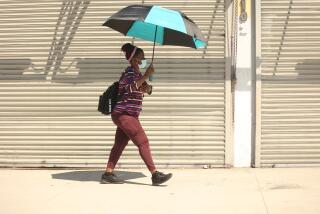Keep Food--and Fun--From Being Spoiled
- Share via
Food poisoning is a year-round problem, but the risk increases during the summer because harmful bacteria can multiply more quickly in food that is exposed to heat. Food poisoning is also more common during the summer because of the opportunity for food to spoil on excursions like picnics and beach outings.
You can minimize your risk of food poisoning by following several basic rules of food safety. Washing your hands is just as important when preparing and handling food away from home. Ideally, wash with soap and running water for at least 20 seconds, because bacteria on your hands can be easily transferred to food (this is particularly important after handling raw meat, poultry or seafood, and after using the bathroom). If running water won’t be available, bring soap and bottled water with you.
Use an insulated cooler to store and transport food. Stock it with enough ice or ice packs to keep perishable food at 40 degrees Farenheit or lower. This is not cold enough to kill bacteria, but it will slow the growth of any bacteria present in food. Place a refrigerator thermometer in the cooler so you can tell if the inside temperature remains cool enough to provide the necessary protection. Transport food coolers in the car’s passenger compartment, not in the trunk, and if you have air-conditioning, keep it on.
As soon as you arrive, remove the coolers from the car and place them in a cool, shady spot. Leave the coolers closed until you are ready to serve or prepare the food; opening coolers warms them up and makes it difficult to maintain the required temperature.
Carry raw meat, poultry and seafood in a separate cooler from prepared perishable foods (such as coleslaw or potato salad) to keep their juices from dripping on the other foods. If you must use the same cooler for all foods, pack each dish in a separate, tightly sealed container. Pack all of your beverages in a separate cooler so you’re not warming the perishables every time someone wants a cold drink.
If you are grilling, don’t rely on the color of the meat or fish to determine if it has been cooked adequately. Insert a food thermometer into the thickest part to measure the internal temperature. Chicken should be heated to an internal temperature of 180 degrees Farenheit (except for thighs, which only need to reach 170); steaks and lamb chops to 145; and pork chops to 160. To check hamburger patties, insert the thermometer through the side of the patty; the internal temperature should reach at least 160.
Fish should be cooked until the internal temperature is 145, or until the flesh is opaque and flakes easily with a fork. Wash the thermometer after each use before reinserting it into the food.
Grilled foods should be kept hot until you are ready to serve them. You can keep cooked meats hot without overcooking them by setting them to the side of the grill rack. Use new, clean utensils and plates to remove meat, poultry and seafood from the grill and carry them back to the table (the original plates and utensils may be contaminated by bacteria left from the raw meats carried to the grill).
To avoid wasting good food, put all perishables back into a cooler as soon as everyone has been served. Leftover food can be transported home safely in a cooler, as long as the food has not been left out too long. If food has been exposed to temperatures of 90 degrees or higher for more than one hour, it should be discarded; in cooler weather, two hours should be considered the outside limit.
Children’s Lunches
Take special care during the summer because lunch boxes and bags may be exposed to high temperatures for several hours before the food is eaten. This gives bacteria too much time to multiply and cause problems. Insulated lunch boxes that keep food cool for a longer time are better. You can also use a frozen juice box or container of yogurt as an “ice pack” to keep surrounding foods cooler. If the weather is extremely hot, you should consider packing foods like peanut butter and jelly instead of highly perishable foods like meat and poultry.
*
Dr. Jonathan Fielding is the director of public health and the health officer for the Los Angeles County Department of Health Services. Dr. Valerie Ulene is a board-certified specialist in preventive medicine practicing in Los Angeles. They can be reached by e-mail at ourhealth@dhs.co.la.ca.us. Our Health runs the second and fourth Mondays of each month.
More to Read
Eat your way across L.A.
Get our weekly Tasting Notes newsletter for reviews, news and more.
You may occasionally receive promotional content from the Los Angeles Times.










